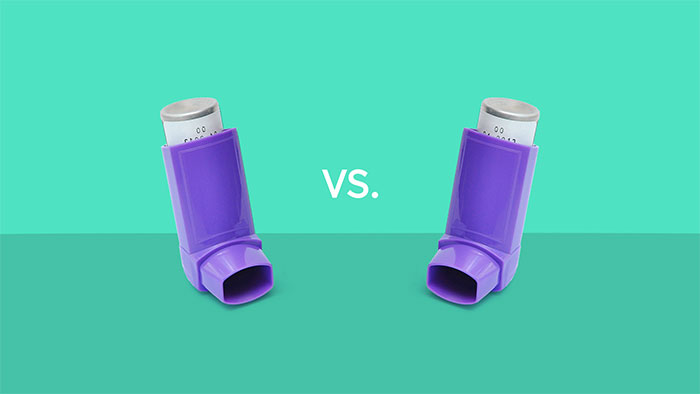When it comes to managing breathing problems like asthma and COPD, Ventolin, and Albuterol are two popular medications that people often talk about. But what makes them different? Are they the same, or are there important distinctions?
In this article, we will examine the similarities and differences between Ventolin and Albuterol. We hope to help you understand these medications better by answering these questions. This understanding will empower you to make informed decisions with the help of your healthcare provider. So, let’s explore how Ventolin and Albuterol are unique and how they can affect your breathing condition.
What are Ventolin and Albuterol?
Ventolin, also known as Albuterol sulfate, is a medication that helps people with breathing problems like asthma and COPD. It quickly relaxes the muscles in the airways.
The Food and Drug Administration (FDA) approved Ventolin in the 1980s, and since then, it has been widely used.
Definition and brief history of Albuterol
Albuterol is a medication just like Ventolin. It helps people with breathing problems like asthma and COPD. Albuterol comes in different forms such as inhalers, nebulizer solutions, and tablets. The FDA approved Albuterol in the 1980s, and it has been used since then.
How Ventolin and Albuterol work in managing respiratory conditions
Both Ventolin and Albuterol help people breathe easier by relaxing and opening up the airways in the lungs. They do this by attaching to certain parts of the muscles around the airways, which causes the muscles to relax.
When the muscles relax, the air passages become wider; which reduces symptoms like wheezing, shortness of breath, and chest tightness. These medications provide fast relief during asthma attacks or when COPD symptoms get worse suddenly.
Ventolin and Albuterol work quickly, but their effects only last for a few hours. It’s important to understand how Ventolin and Albuterol help manage breathing problems, but it’s always best to talk to a healthcare provider to decide which medication and form is best for you based on your individual needs and medical history.
Similarities between Ventolin and Albuterol
Ventolin and Albuterol have some things in common regarding how they work and what they can do. Here are some of the things they share:
Help with Breathing:
Both Ventolin and Albuterol are bronchodilators, which mean they relax or widen the airways in the lungs. This makes it easier to breathe, especially for people with conditions like asthma or COPD.
Fast Relief:
They are short-acting bronchodilators, meaning they work quickly to bring relief from symptoms during sudden episodes of respiratory conditions. They can relieve asthma attacks or when COPD symptoms worsen suddenly.
Bind to Receptors:
Ventolin and Albuterol are classified as beta-agonists. They attach to certain receptors in the muscles around the airways, causing the muscles to relax and widen the air passages. This helps to reduce symptoms like wheezing, shortness of breath, and chest tightness.
Common Side Effects
While Ventolin and Albuterol are generally safe, they can have some side effects in some people. Here are a few common side effects that can occur with both medications:
Fast Heartbeat:
Both Ventolin and Albuterol can increase heart rate as a possible side effect. However, this is usually temporary and not harmful. People with certain heart conditions should be cautious.
Tremors or Shakiness:
Some people may experience mild shaking or trembling with both medications due to their effects on the nervous system.
Increased Blood Pressure:
In some cases, Ventolin and Albuterol can cause a temporary increase in blood pressure. However, this is less common and not usually a big concern.
Headaches:
Although rare, headaches can occur as a side effect of taking Ventolin or Albuterol.
Precautions and Considerations
There are a few important things to keep in mind when using Ventolin or Albuterol:
Allergies:
Some people may be allergic to Ventolin, Albuterol, or the inactive ingredients in these medications. It’s important to tell your healthcare provider if you have any known allergies or if you’ve had bad reactions to bronchodilators in the past.
Medication Interactions:
Ventolin and Albuterol can interact with other medications, like beta-blockers or certain antidepressants. It’s important to inform your healthcare provider about all your medications to avoid any potential interactions.
Differences between Ventolin and Albuterol
Ventolin and Albuterol are similar in many ways, but they also have some differences. Here are the main ways in which they are different:
Active Ingredient:
The main difference is the active ingredient they contain. Ventolin contains Albuterol sulfate, while Albuterol is the generic name for medications that contain Albuterol sulfate. Ventolin is a brand name for a specific type of Albuterol medication.
Brand vs. Generic:
Ventolin is a brand-name medication, while Albuterol refers to the generic form of the medication. Brand-name medications are usually better, while generic versions are typically more affordable.
Prescription vs. Over-the-counter:
Ventolin requires a prescription from a healthcare provider, while some forms of Albuterol can be bought without a prescription. However, this depends on where you live and the regulations in place.
Conclusion
To sum it up, Ventolin and Albuterol are the same because they have the same active ingredient called Albuterol sulfate. The only difference is that Ventolin is a specific brand name for a type of Albuterol medication, while Albuterol refers to the generic versions of medications with Albuterol sulfate.
Having similar medications available under different brand names or as generics is helpful because it gives people choices regarding availability and cost.
Overall, Ventolin and Albuterol are both effective treatments for respiratory conditions. They give people a way to manage their breathing problems and improve their overall health. If you talk to a doctor, they can help figure out the right medication for you, and you’ll be able to breathe better and feel better.
